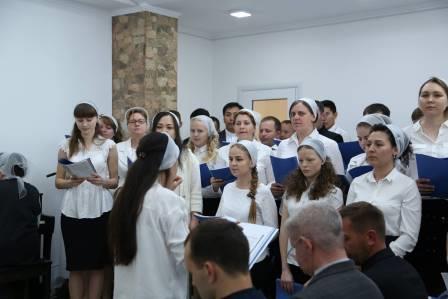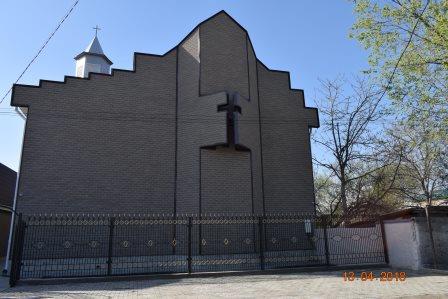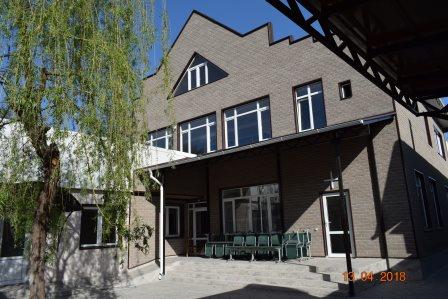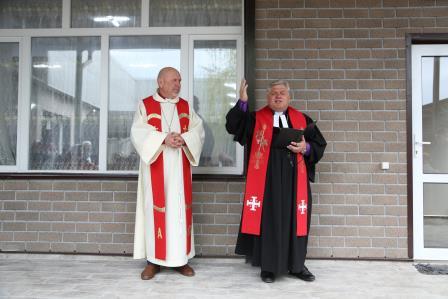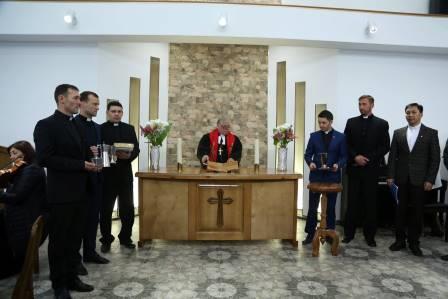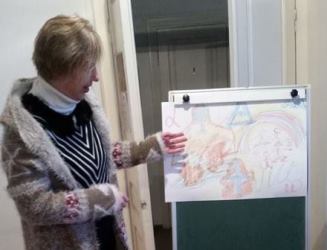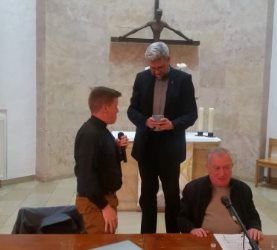|
|
April 2018
“The Theology and Poetry of Dietrich Bonhoeffer” Moscow On April 15th Sts. Peter and Paul Cathedral in Moscow hosted a conference dedicated to the legacy of the 20th century martyr, Lutheran pastor Dietrich Bonhoeffer. “The life of Bonhoeffer is one of testimony and martyrdom;” with these words the Archbishop of the Evangelical Lutheran Church, Dietrich Brauer, opened the conference. Bonhoeffer ”looked straight into the eye of the very difficult question what it means to be a Christian, what it means to follow Christ, in an inhumane environment, in a totalitarian state. He clearly and without fear point out to his Church the threats that faced her.” As a pastor he called Christians to “wake up, come a live, grow up, and the Church to stop sleeping and keeping silence, to stop being self-interested.” Bonhoeffer needed to remind his congregation members that the Church “cannot be the church of Luther or the Church of the German people. It belongs to Christ;” Bonhoeffer himself became a “living sermon,” the Archbishop said.
He also touched on the theme of “religionless Christianity” that is found in Bonhoeffer. “The Christian faith is not the same as the Christian religion or worldview. A sermon is not a pious template. It should be ‘religionless,’ accessible, understandable... A person becomes a Christian not through a religious ritual but by taking part in the sufferings of God in everyday life. That is what metanoia is, not to think first of all about your own troubles, problems, sins, and fears but to allow yourself to be drawn to the path of Jesus Christ...” the Archbishop said referencing the memorable words of the martyred pastor. «Religionless Christianity” was the central theme of the conference, with two author theologians, Professor Svetlana Konacheva from the Russian State Humanitarian University and President of the Novosartavoka Theological Seminary, Dr. Anton Tikhomirov also speaking on the theme. Tikhomirov spoke about Bonhoeffer's poetry as a place where he sought a new language for “religionless” Christianity. based on the article by Yulia Zaitseva, www.blagovest-info.ru.
Restoration of the Facade at Petrikirche to be Completed by Reformation Day St. Petersburg Restoration work on the facade of Sts Peter and Paul Cathedral has begun! The state-financed work is scheduled to be completed by October 30, 2018. The “Arkada” company put in the winning bid for the work and began to prepare the site on April 2nd. In the first three weeks the church's two towers were “clothed” in scaffolding, and the statues of St. Peter and St. Paul were enclosed in special protective boxes.
The project preparation was completed using church funds and includes the full restoration of all the entry doors, windows, towers, walls and exterior decorations.
A New Home for the Congregation in Bishkek Bishkek In the capital of Kyrgyzstan on April 8th a long-awaited event took place – the dedication of a new house of prayer – the main cathedral of the Evangelical Lutheran Church in the Republic of Kyrgyzstan (ELCRK). The Archbishop of the Evangelical Lutheran Church in Kazakhstan, Yuri Novgorodov, was present at the dedication, as were all the pastors and preachers of the ELCRK and many congregational members from the local and nearby (Vinogradnoe, Tokmok, Nizhne-Chuisk, Belovodskoe, Kant, Kirovskoe) congregations, the German ambassador, as well as guests from Germany and Kazakhstan. The previous prayer house was partially destroyed in a fire on January 27, 2015. While that day was a tragedy for church members, now the new building has opened up its doors and it a wonderful reason to celebrate. The words of greeting that could be heard all around - “Christ is risen!” took on a special meaning this year. During the celebratory worship service ELCRK bishop Alfred Eicholtz recalled with tears in his eyes what horror he felt as he heard watched the church burn and heard the bell as it crashed to the ground together with the bell tower. He remembered the questions that were asked to which he had no answer at the time - “Why didn't your God help you?” He shared his thoughts about how it is especially important to trust God especially when you don't see how His Providence is leading, when you can't find any answers. Time has shown, said the bishop, why God allowed the fire to happen and how He has been glorified in its restoration. All who gathered for the celebration met in the church's courtyard. In front of the entrance and then during the worship service there was music by the Chyusky chamber orchestra. The bishop greeted those who were gathered and introduced the architect Sergei Karchin and Pastor Valentin Limanovich, who was responsible for the detail work on the building. During worship the mixed choir of the ELCRK (more than 50 people!) sang.
It is worth noting that despite the fact that the congregations are spread out, people in the congregations know each other relatively well thanks to regular church-wide events; they were particularly happy to meet this time. No one was a “guest,” but felt that this building would be their common home; after all, each in his or her own way contributed – whether it was through finances, through donating food, or by working on the cleanup after the fire. Everyone was praying constantly for God to bless the Bishkek congregation and all were thankful to the Lord for His work to make the building happen. The lack of a church building didn't get in the way of congregational ministry. Even on the day of the fire, despite the tragic event, the scheduled Bible study took place all the same. People who came to Bible study that day didn’t know what to expect, and saw before them the sad picture of burnt church. That Bible study, which was held in the nearby building of the seminary, was very memorable. The ministers who smelled of burning and smoke, dejected by what had happen, called on everyone to humbly accept God's will and to trust Him in this difficult situation. From that time until April 8th of this year, meetings of the Lutheran congregation in Bishkek took place according to their regular schedule in the building of the seminary, and congregational life didn't stop even for a minute. This confirms the Biblical teaching that the Church is not a building, but Christians gathered in the name of the Triune God.
Bishop Alfred Eicholtz thanked everyone for their contributions to the restoration of the cathedral. He spoke about the importance of the words of support he received at the time from various parts of the world. It wasn't just members of the ELCRK who gave offerings for the church, but many others who sympathized with them and gave what they had. Bishop Eicholtz spoke about the coins gathered by children in the congregation in Astana as a symbolic offering that was passed on at the time by Bishop Novgorodov. The latter in his sermon said that all the participants of the restoration had received “a kiss from God” insofar as they became builders of His house. “You can build many houses, but building God's house comes around once in a lifetime.” He emphasized that the pain that brothers and sisters underwent in Bishkek was felt by the church in the whole post-Soviet territory. He gave them an altar Bible and passed on congratulations from all the Lutheran Churches that are part of the Union of Evangelical Lutheran Churches. The celebratory events lasted from 9 in the morning to 6 in the evening with a lunch break. The congregation in Bishkek as the hosts invited the guests – more than 300 – to lunch. Hot pilaf, prepared outside over an open flame, and hot and sweet tea were ideal for the cold weather on this spring day. All the guests wished that sounds of praise and thankfulness to God would never go quiet in this building and that it become a real home for many who have found salvation there.
Former congregational members who have moved to Germany were also present at the event; among them were Woldemar Schal and the former president of the Synod Alexander Schantz. In their words of greeting they emphasized how important it is that the Lord's house be filled with people. Eduard Penner led a group of guests from the German “Society of Evangelical Lutheran Germans from Russia.” He said that their society closely follows the developments of the church in Kyrgyzstan, and in their quarterly newsletter there is a block of news about their church. When Christians in Germany, especially those in “brother congregations,” heard about the 2015 fire, they were filled with sympathy and a desire to help. While they knew that God can certainly work in places without any walls, prayer houses are something that we people need, since they help us to come together around God's Word. Eduard Penner addressed the congregation with the wish that their building would become a place of meeting between God and man so that people could see Him there, hear Him and praise Him, and that through the Lord's Supper come into communion with the Church. He noted that the new church in Bishkek is one more piece of evidence of God's love which calls us to learn to trust God during all the stages of our lives. Maria Lyanguzova
The Church on a Sheet of Paper Kvareli (Georgia) From April 20th to 22nd in the congregation in Kvareli a seminar was led by Seminary President Dr. Anton Tikhomirov from the St. Petersburg and the Bishop of the Evangelical Lutheran Church of Georgia Markus Schok. The themes of the seminar were the life and theology of Martin Luther as well as our Church. It is worth noting that this was the first time that the congregation in Kvareli has had such a collection of guests. Church staff, pastors, and youth sat next to one another with an equal level of interest and engagement and this made for a lively, creative atmosphere.
The theme of the first day was the Church and our understandings of it. Bishop Schoch suggested that each of the participants draw on a piece of paper how they see our church and what they would like our church to become. After this it became clear that we can “build” a Church to which people will come with joy. After all we were exceptionally unified in our vision of what the church should be - the drawings had at the center the cross, a heart filled with faith and love, the Bible, children and adults holding hands.... The theme of the second day was the life and theology of Martin Luther. Anton Tikhomirov spoke about the Medieval context of the Reformation, the daily life and religious experience that affected Luther. We saw how the Reformation developed in stages and how it became the basis for the teachings of both Lutheranism and many other Protestant denominations. Everyone took part in conversations; the youth, too, were active and tried to grow in knowledge. That means that the youth love their church and want to actively participate in its life and to take on responsibilities for ministry. This is a great sign that our church has a future. Shamil Somkhishvili
On Religion and Freedom Tbilisi I arrived in Tbilisi again just before the “Luther Days 2018” held in the Evangelical Lutheran Church in Georgia, April 22nd-23th. I was especially happy to see Cuttino Alexander, our former intern and now pastor in Ocean Springs, Mississippi, who six years after his internship returned to Georgia together with his wife Jessica and small son Daniel. Dr. Georgi Anriadze from the Georgian Academy of Sciences spoke about the theme “freedom and religion” from an Orthodox point of view, and Dr. Anton Tikhomirov, President of the Novosaratovka Theological Seminary, from the point of view of Lutheran theology. The question of freedom and its relationship to humankind, society and the state plays an important role in all religions. Freedom is a particularly Lutheran theme insofar as Martin Luther during his whole life sought for himself and for his fellow Christians the freedom based in faith in the forgiveness of sins. He understood that not only the state but the Church itself can become an enemy to Christian freedom when it makes a person dependent on itself; this freedom is given only by God's grace. In this regard Georgi Andriadze noted critically a number of situations in which the state and the church in Georgia meddled in one another's affairs. He also expressed his hope that the Georgian Orthodox Church would someday return to the World Council of Churches, which is left around 12 years ago.
Anton Tikhomirov laid out the Lutheran teaching on the two kingdoms, the divine and the civil, which mutually effect and complement one another. The first of these is there for salvation while the second is for the preservation of Creation. Cuttino Alexander described the leading role of Church and Christianity in the USA for the constant renewal of the state and society and their unity in the spirit of freedom. He noted that the controversial nature of current American politics is a large challenge for the churches. There were more people attending, including more guests from outside the ELCG this year than in previous years. It was important and useful for our church in Georgia that for the first time one of the presenters at the Luther days was a representative of the Orthodox church. Hans-Joachim Kiderlen
|

.jpg)
.jpg)
